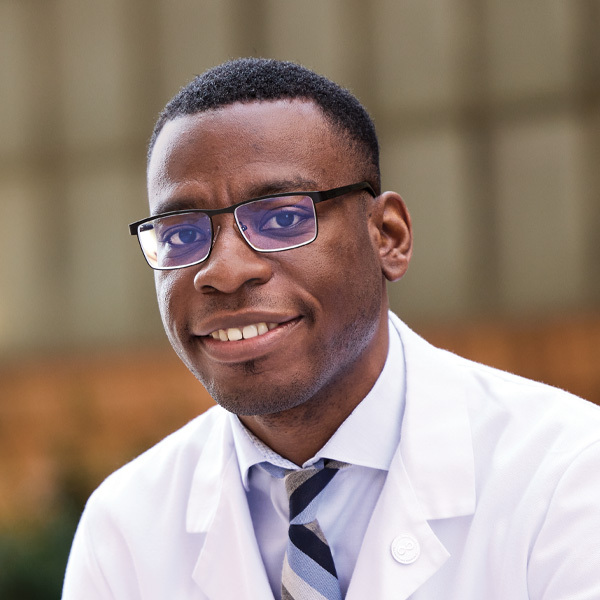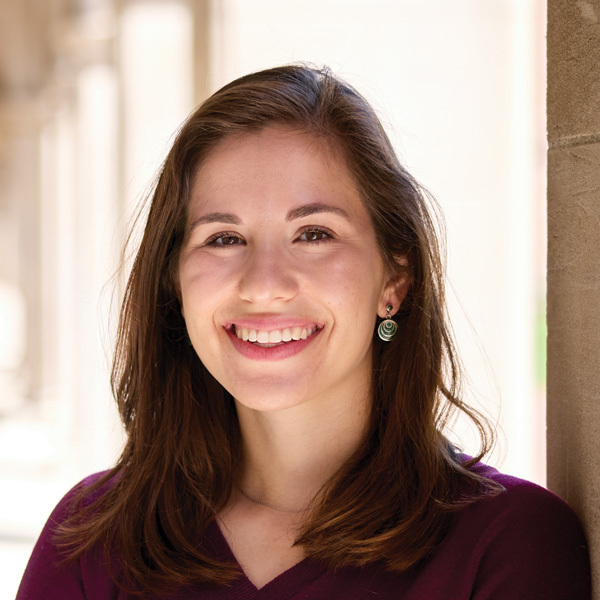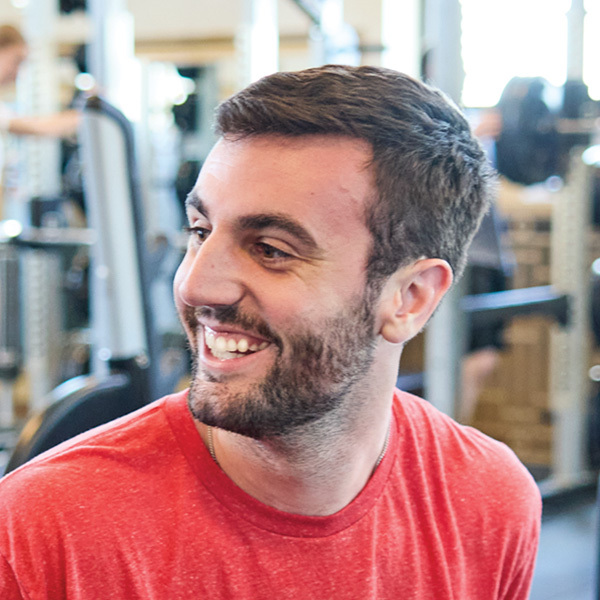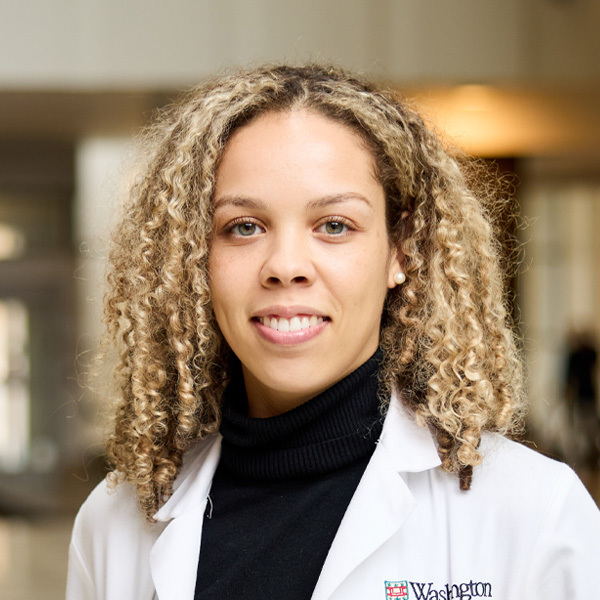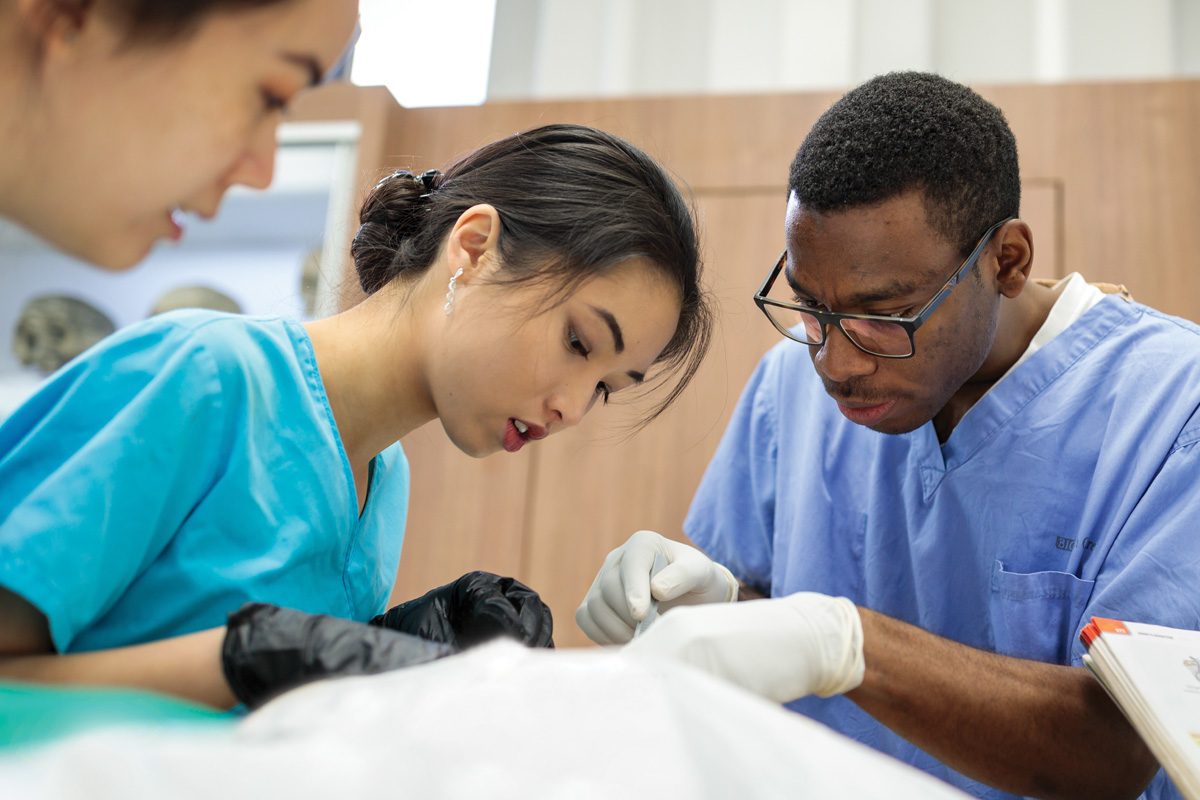
At the most basic level, scholarships help students pay for medical school. But the impact of this support extends far beyond aspiring physicians and their tuition bills.
Scholarships enhance the School of Medicine’s ability to enroll the most talented students and enable them to take advantage of a vast array of training and mentorship opportunities from world-class faculty members. This, in turn, shapes students’ goals and their futures as leaders in medicine.
Read more about how scholarships affect the education of individual students and empower the school in its recruitment efforts.
Improving medical care in Nigeria
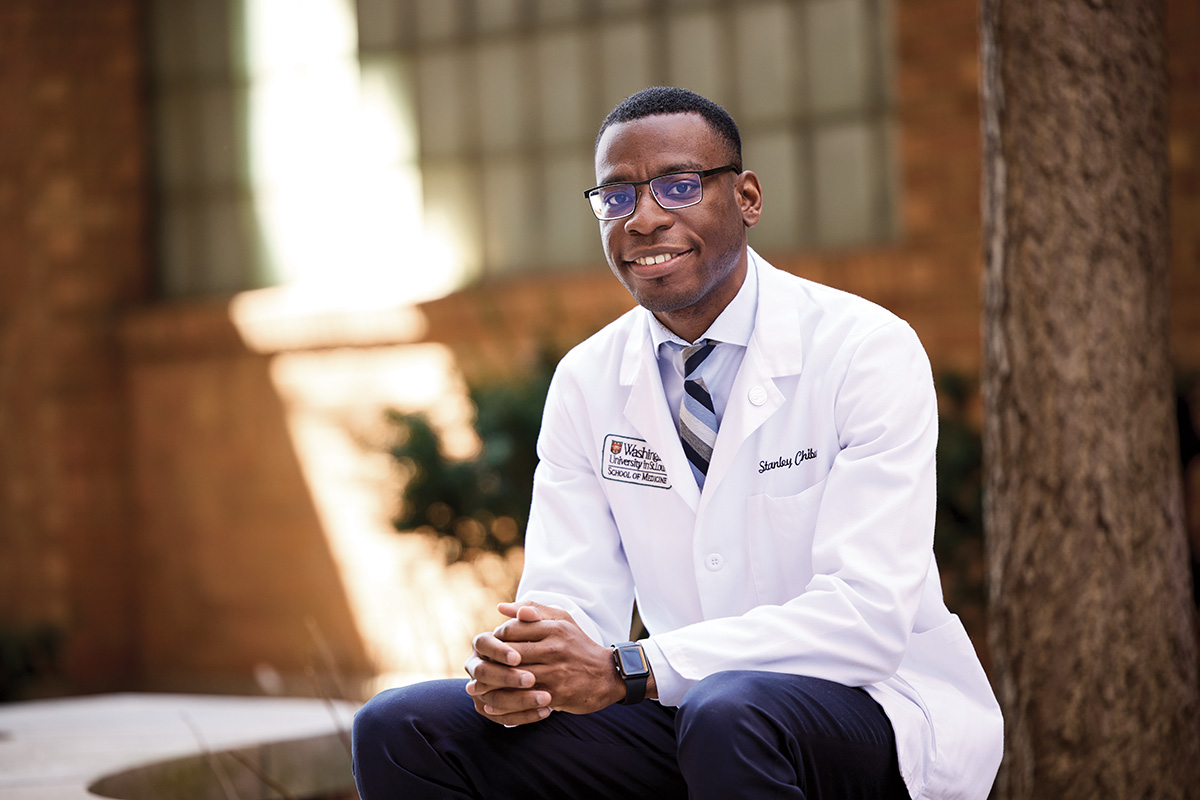
Stanley S. Chibueze
Class of 2023
Hometown
Anambra, Nigeria
Undergraduate degree
Neurosciences,
Vanderbilt University
Photo Credit: Matt Miller
Stanley Chibueze’s path to medical school began with a life-threatening illness. While he was finishing secondary school in Nigeria in 2006, he contracted cerebral malaria and fell into a coma. His treatment and recovery sparked a desire to become a physician and improve the medical system in his country.
After working in Nigeria for several years to help put his siblings through school, Chibueze made his way to North Texas and eventually Nashville, Tenn., where he earned a bachelor’s degree at Vanderbilt University. Though he planned to attend medical school close to family in Texas, he visited WashU on a lark during Second Look Weekend.
“That trip changed my mind,” he said. “From the get-go, I noticed the people here are down to earth and super smart. These amazing clinicians and researchers seemed very open to interacting with students and connecting them to resources.”
“I want to play a bigger role in improving health-care access for people who really need it.”
A scholarship offer made it possible for Chibueze to come to WashU, and his time here has exceeded all expectations, he said. Backed by another scholarship from the university’s Olin Business School, he took a year off from medical studies and recently completed coursework for an MBA. He leveraged skills gained through the program to advance a health-care startup he helped found in 2018 that provides clinical and diagnostic services in the Nigerian capital, Abuja.
“In addition to being a doctor, I want to play a bigger role in improving health-care access for people who really need it,” Chibueze said. “To do that, I needed other skills to help me understand the business side of health care. Scholarships have allowed me to get those skills.”
Scholarships also have opened doors to other experiences, including research with otolaryngology faculty members and a role as co-leader of the student team working on the medical school’s accreditation review process.
“Before coming here, I didn’t understand the concept of giving back to an institution that had supported you financially, intellectually and emotionally. I do now. I am so grateful to those who make it possible for WashU to offer scholarships, and I want to pay it forward in the future.”
Advocating for change
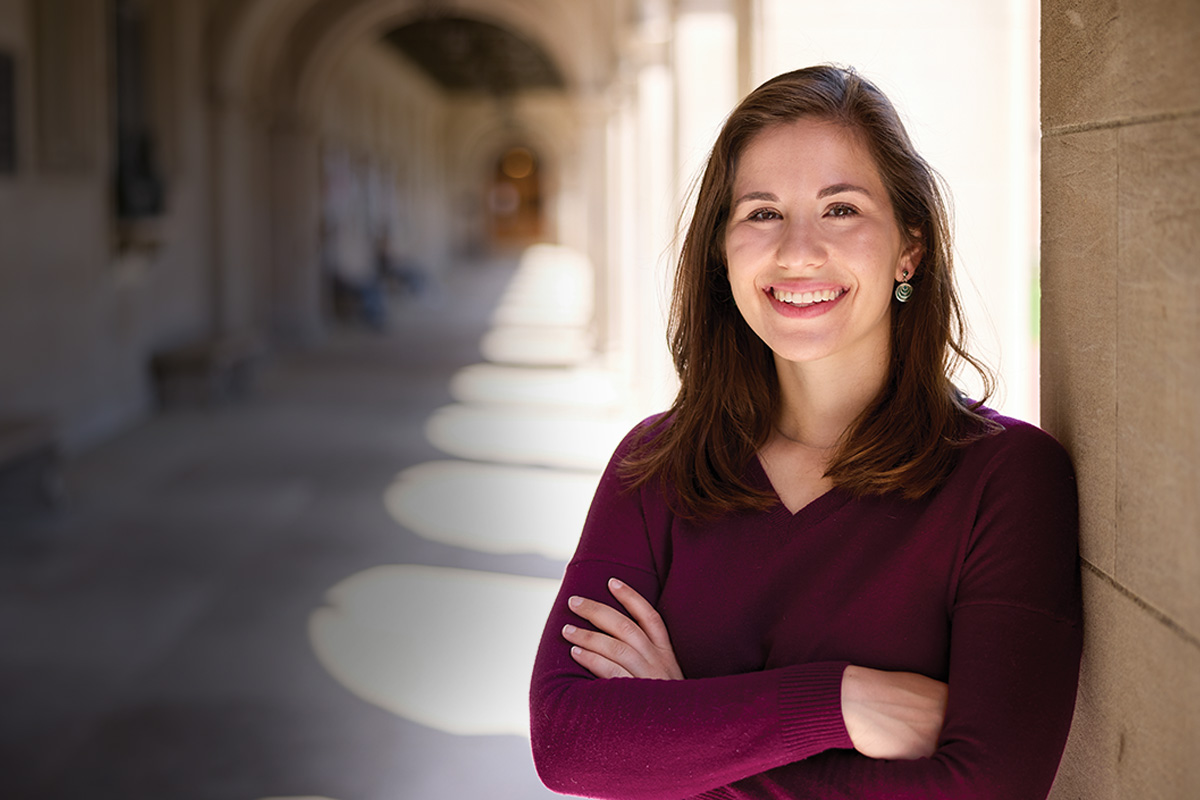
Sarah Y. Cohen
Class of 2023
Hometown
St. Louis
Undergraduate degree
Molecular, cellular and developmental
biology, Yale University
Photo Credit: Matt Miller
Before she ever applied to medical schools, Sarah Cohen was attracted to patient care, education and research. By the time she completed her undergraduate degree and a gap year that followed, she had worked in a hospital emergency department, educated high school students about reproductive health, and conducted quality-improvement research.
So when she visited WashU as an applicant, she was excited to learn about opportunities to strengthen her academic medicine skill set. “The fact that the school was planning to build a new curriculum really drew me in,” she said. “I wanted to be involved. And it seemed like the administration welcomed student voices and participation.”
“My scholarship has allowed me to recognize how I might build a career that improves the health of patients and communities.”
A full-tuition scholarship helped bring Cohen to WashU, where she joined a student committee that helped build the Gateway Curriculum. “I loved it even more than I expected to,” she said. “Our meetings became one of the best parts of my week.” She currently serves as a medical education representative within Medical Student Government and co-leader of a student team preparing for the medical school’s accreditation visit in 2023.
Cohen, who plans to specialize in obstetrics and gynecology, also conducts research with associate professor Tessa E. Madden, MD, on premature rupture of the membranes during pregnancy. And she worked with two other students to draft policies on sex education and immunization exemptions that were adopted by the Missouri State Medical Association.
The policy work and an interest in health program design spurred her to pursue a master’s degree in public health at WashU’s Brown School. She will complete her coursework there this summer before returning to the medical school for her final year.
The breadth of her activities has strengthened Cohen’s desire to become an academic physician. “My scholarship has allowed me to recognize how I might build a career that improves the health of patients and communities,” she said. “I know my training will make me a better clinician and give me tools to advocate for and implement change in medical education, the health-care system and beyond.”
Exploring new pathways
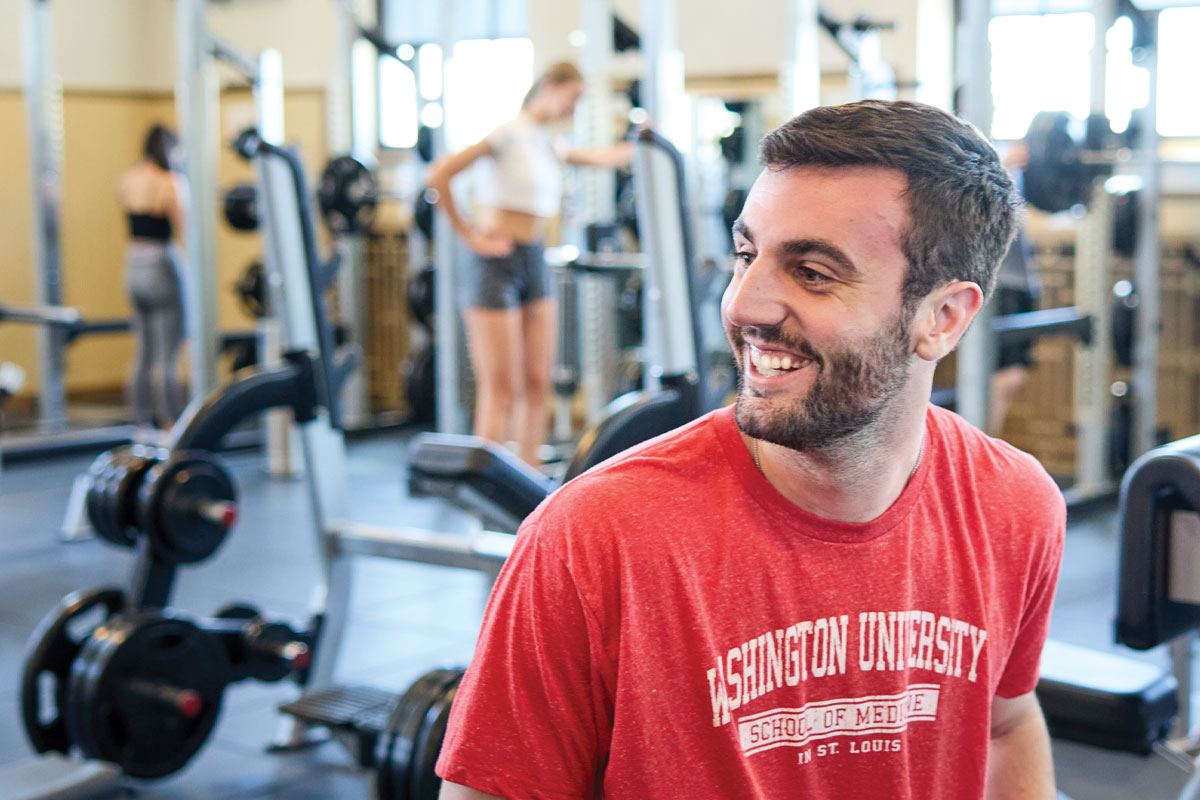
Read A. Streller
Class of 2025
Hometown
Edmond, Okla.
Undergraduate degree
Chemical biosciences,
University of Oklahoma
Photo Credit: Matt Miller
When Read Streller played competitive tennis in high school, he warmed up for St. Louis tournaments on the courts at Hudlin Park, adjacent to the medical school and Barnes-Jewish Hospital. He never imagined he would see those courts on a regular basis as a medical student.
Streller didn’t plan to attend medical school at WashU. He applied to the University of Oklahoma, his undergraduate alma mater, where he played basketball as a walk on, and other schools. At his mother’s suggestion, he added the School of Medicine late in his application process.
“After interviewing at different schools, WashU was my favorite,” said Streller, who scored in the 100th percentile on the MCAT. “The school’s Gateway Curriculum was a big factor. But I also was impressed with the effort the school put into interacting with applicants via Zoom during the pandemic. It made me feel important and welcome.”
“Having one of those huge burdens taken away has allowed me to enjoy my time here.”
Initially placed on the waitlist, he made plans to attend another top-tier school — one that did not offer financial assistance. Later, when WashU called with a scholarship offer, he made the switch. “I have four younger siblings in college,” he said. “My parents couldn’t help me pay for medical school, and I didn’t want to take on so much debt.”
The financial assistance relieved some of Streller’s concerns about attending medical school. “The expectations, length of training and then going under the hood for $260,000 — that’s a lot of pressure. Having one of those huge burdens taken away has allowed me to enjoy my time here.”
Medical school faculty members have opened his eyes to different career options. The Gateway Curriculum’s Explore program, an immersive professional development experience that spans all four years, will further that process. He is pursuing the program’s innovation pathway, which focuses on advancing medicine through entrepreneurship, leadership and systems change. “This isn’t an area I would have considered before,” he said. “But I am really excited to see where it takes me.”
Broadening professional aspirations
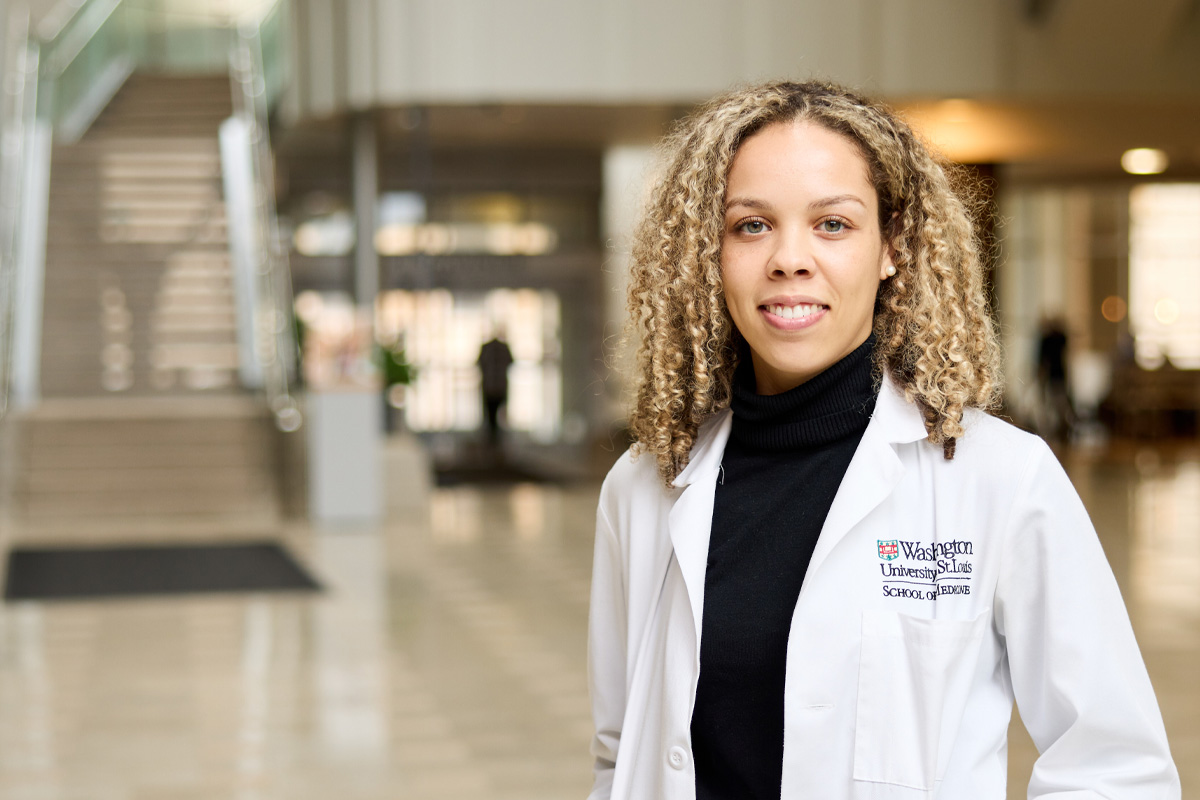
Janessa A. Sullivan
Class of 2023
Hometown
Tallahassee, Fla.
Undergraduate degree
Psychology, Wellesley College
Photo Credit: Matt Miller
As a first-year medical student, Janessa Sullivan wanted to learn more about the specialty of plastic and reconstructive surgery. Working from a list of faculty members who had collaborated with students in the past, she identified Terence M. Myckatyn, MD, professor of surgery, as a potential mentor.
“I cold-emailed him, and he agreed to meet with me,” Sullivan said. She ended up conducting research with Myckatyn on clinical outcomes and quality of life in breast reconstruction patients and went on to work with other plastic surgery faculty members as well.
These collaborations helped solidify Sullivan’s decision to pursue a career in the field. “I’m drawn to the reconstruction side of things because it has such an impact on patients,” she said. They also sparked an interest in academic medicine. “Working with Dr. Myckatyn and other attendings helped me see the ways medical practice can intersect with research and outreach in an academic setting.”
“It makes me feel like I can do anything. I can choose any specialty, do community-based work or go into academic medicine because I don’t have to worry about debt. It’s very freeing.”
Sullivan has taken advantage of other opportunities to enrich her education: serving as president of WashU’s chapter of the Student National Medical Association, which addresses the needs of underrepresented minority medical students; teaching anatomy to high school students through the Office of Diversity Program’s Saturday Scholars Program; and talking to prospective students about the medical school as an Admissions Committee liaison.
In her conversations with applicants, Sullivan discusses her reasons for choosing WashU, including the strong sense of community she observed among students when she first visited. “Being a premed student can be competitive and intense, and I didn’t want that kind of environment in medical school,” she said. “The students here genuinely enjoy themselves. They are supportive of each other.”
In addition, WashU’s scholarship offer topped those Sullivan received from other schools. She didn’t fully recognize the benefit of this until recently. “It makes me feel like I can do anything,” she said. “I can choose any specialty, do community-based work or go into academic medicine because I don’t have to worry about debt. It’s very freeing.”
Published in the Summer 2022 issue



